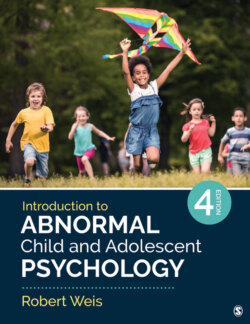Читать книгу Introduction to Abnormal Child and Adolescent Psychology - Robert Weis - Страница 97
На сайте Литреса книга снята с продажи.
Social Cognition
ОглавлениеSocial cognition is an important aspect of cognitive development that concerns our capacity to think about social situations. Social cognition is based on social information processing theory, a general model for how humans perceive, judge, store, and retrieve social information. Central to the notion of social cognition is the idea that we form schemas, or mental models about ourselves and others. These schemas are based on prior interpersonal experiences, and they guide and direct future social behavior. For example, a child with well-developed social skills and many friends might expect a new classmate to be friendly. He might approach the new classmate and ask him to play during recess. In contrast, a child who is socially awkward and rejected by her peers might anticipate that a new classmate would also reject her. Consequently, she might avoid the new classmate (Bargh, 2013; Fiske & Taylor, 2013).
Problems with social information processing underlie many childhood disorders. For example, children who engage in aggressive behavior toward peers typically have negative schemas regarding themselves and others. Furthermore, when confronted with social problems, they tend to perceive others’ actions as hostile or rejecting and have difficulty generating peaceful problem-solving strategies (Dodge, Godwin, & Conduct Problems Prevention Research Group, 2013). Similarly, children with depression often view themselves as ineffective in social situations. When confronted with social problems, they tend to shy away from others, often leading others to reject them, confirming their low self-worth. Fortunately, therapies have been developed to improve children’s social information-processing skills and alleviate children’s behavioral and emotional problems (Michl, McLaughlin, Shepherd, & Nolen-Hoeksema, 2013).
Review
Piaget identified four stages of cognitive development. These stages describe children’s increased capacity for thinking, problem-solving, and language.
Social cognition refers to children’s ability to think about social situations and solve interpersonal problems. Some childhood disorders are associated with social problem-solving biases or deficits.
